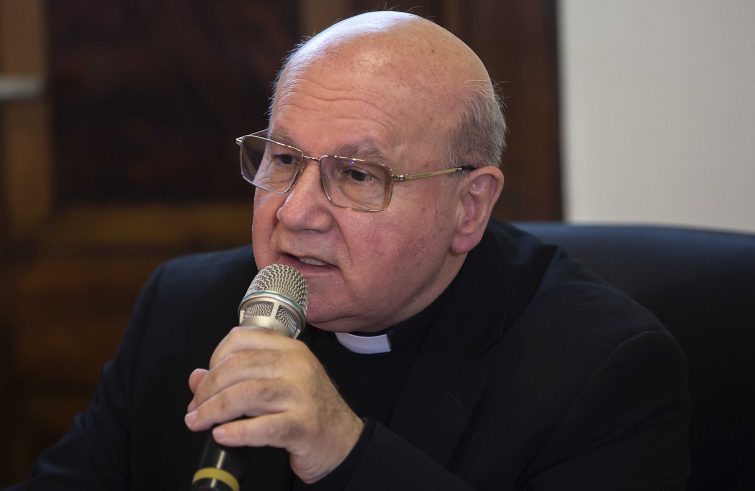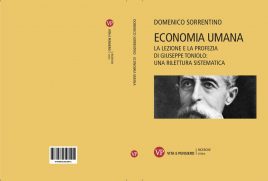
A systematic reading from A to Z of the thought of Giuseppe Toniolo, economist and leader of the Catholic movement at the turn of the century. His thought was not widely known and has been forgotten, but it has gained topical relevance today in the light of a global economy that has undoubtedly grown but is still confronted with dramatic challenges such as inequality, poverty and ecological disruption. Tonioli’s conception of the relationship between ethics and economics is explored in the latest book by Monsignor Domenico Sorrentino, Bishop of Assisi-Nocera Umbra-Gualdo Tadino and Foligno, ” Economia umana. La lezione e la profezia di Giuseppe Toniolo: una rilettura sistematica” (Human Economy. The lesson and prophecy of Giuseppe Toniolo: a systematic review), published by Vita e Pensiero, publishing house of the Catholic University of the Sacred Heart.
 Your Excellency, why did you feel the need to write a book on the lesson and prophecy of Giuseppe Toniolo today?
Your Excellency, why did you feel the need to write a book on the lesson and prophecy of Giuseppe Toniolo today?
Giuseppe Toniolo, who lived between 1845 and 1918, was an emblem of the Catholic world.
He was a veritable prophet of social doctrine and in particular of Rerum Novarum. Sadly, he was subjected to marginalisation. Even today, even among Catholic economists, with the exception of a small circle of experts in his thought, he is little known. This is also attributable to the fact that his works are hard to find nowadays. I have been studying Toniolo’s writings for some time, especially from a theological and spiritual perspective, in the hope that some economist would decide to revive his economic thought. Finally, making the most of the pandemic’s strictest lockdown period, I decided to do it myself. Because I am not an economist, I wrote on this subject with awe and trepidation. Yet I was confident that I could count on my long acquaintance with Toniolo’s works. Ultimately, I let him speak. The outcome – I believe – is a useful resource for understanding his economic thought from A to Z. The economist Toniolo will henceforward be discussed with renewed awareness. I hope it will serve as inspiration for experts, but also as an opportunity for those individuals interested in his work.
The title refers to a ” human economy”: what direction has the realm of economics taken today?
Toniolo was a fervent advocate of human dignity, workers rights, and the “humane” organisation of labour.
When he spoke of man, he meant the human person in his/her entirety. “Human economy” is a conception he developed, key to understanding his thinking. The emphasis is on the human element, as opposed to the role played by capital in contemporary economics. Toniolo condemned the tendency of capital and technology to prevail over man. This drift was already wreaking havoc in his days, provoking the response of Marxism, and was bound to cause more serious damage with the progress of industrial economy.
We are now at a very critical juncture in human history. The “fourth industrial revolution”, in the age of the internet, of artificial intelligence, of robotics, is offering us thrills, but in many ways it is also alarming.
What are the major problems we are experiencing globally, exacerbated by the pandemic?
The problem of inequality is the most conspicuous, and the pandemic has brought it to the fore. Wealth is concentrated in the hands of a few, while a multitude of human beings lacks the bare essentials. One result is human migration sparked by war, hunger and climate change.
It’s the plight of the poor. It was a very serious issue in Toniolo’s day, and it remains a global tragedy today, not least as a consequence of the tendency of technology-based economies to do without the human element and thus cut employment.
Will the future bring new job opportunities? It might. But in the meantime, we are facing a worrying situation. The current spiralling pace of technological progress raises the question of the resilience of the human factor. How long will we be able to govern this development in such a way that man is not swept away by it?
With this book, are you calling for a different economy?
I am not an economist. I let Toniolo speak for himself. Nevertheless, I dare to ask questions to economists from his school of thought. I was honoured by the fact that a renowned economist like Stefano Zamagni introduced me to the topical relevance of Toniolo. He said Toniolo had been marginalised for being ”ahead of his time”. I agree. I have written this book also driven by my pastoral role. It is necessary that the Gospel shed its light also on the realm of economics.
Blessed Giuseppe Toniolo: even his economic thought has the flavour of the Gospel.
What can we learn from Toniolo today?
There is a lot to learn. In the conclusion of my book I outline what I believe to be the principles of a ‘healthy’ economy. I draw them from Toniolo’s thinking.
They comprise the humanistic principle, the solidarity principle, and the ethical principle.
These concepts encapsulate the physiognomy of an economy worthy of the name, starting with its root, “oikos”, meaning the specific and generative horizon of the economic process, namely the care of the home, ranging from the small to the vast “common home” of creation. Toniolo’s thought, properly understood, stripped of the inevitable dated aspects, is one that has much to say even today.
Can the economy be in harmony with anthropological grounds, moral values and human fraternity?
Not only it can, it must. Without these foundations and values, it boils down to a sheer process of material wealth growth, which fails to offer humankind what it most longs for: happiness – that genuine, well-distributed happiness that Toniolo related to civilisation, expressed comprehensively, integrating the material perspective with the spiritual one – the only perspective that can elevate the well-being of humankind to its fullest.
How can young people contribute to an economics with a human face?
Our experience with thousands of young economists involved in “The Economy of Francis” process, initiated by the Pope for the renewal of the economy, is encouraging. It shows that
young people are perceptive sentinels of change.
They are capable of analysing it, distinguishing the problematic and unacceptable aspects from the authentic and plausible ones. I believe that a renewed approach to Toniolo’s thought constitutes a valuable opportunity for the purpose of such discernment.












